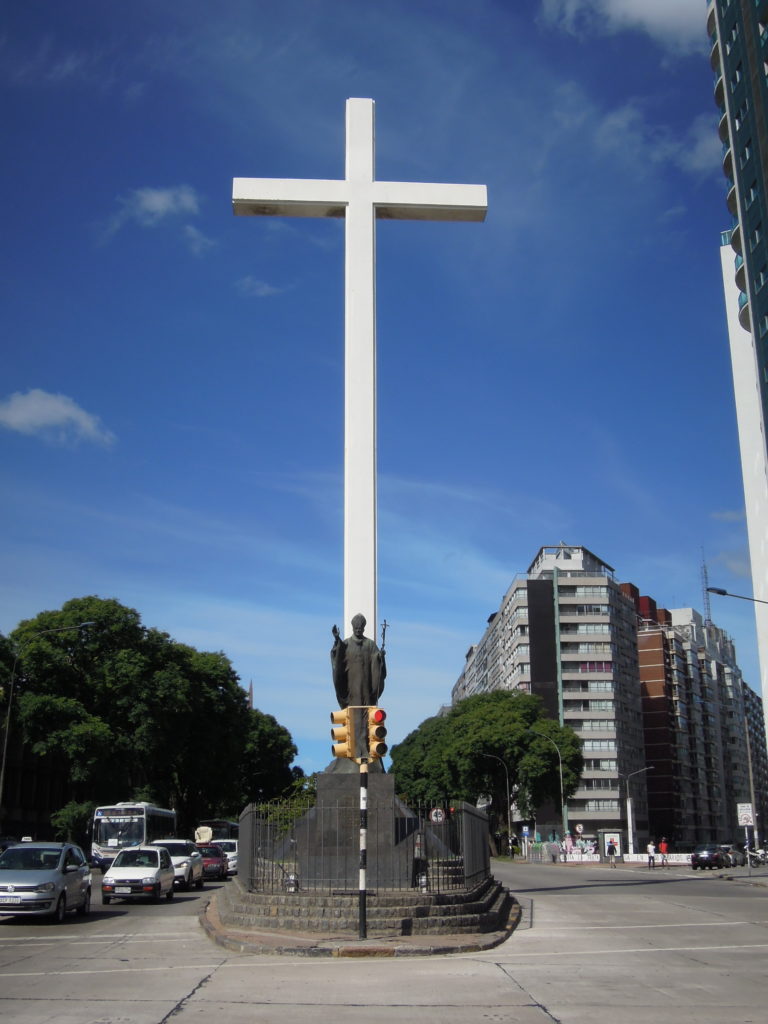On Thursday, May 14, 1987, no senator was absent from the Chamber's meeting at the Legislative Palace in Montevideo. The respective political parties had left their representatives free, so that each one could vote in conscience on this really crucial issue: to approve or not the law, so that the cross that, a little more than a month before, had presided the Mass of Pope John Paul II in the Uruguayan capital, would remain in its place.
The session had a high level of interventions: 21 of the 31 members of the senate spoke. Some confessed to being baptized, but not practicing; others, agnostics; others, seekers of the truth without having found it... In short, they all had to manifest themselves in front of the Cross. It was a historic debate, as several senators described it, surprised themselves to be debating such an unusual topic.
What is the secularity of the State?
The intervention of Senator Jorge Batlle aroused particular interest, for two reasons: first, because if times had certainly changed, his last name immediately evoked the anti-Church rage of his great uncle, José Batlle y Ordóñez; but his words were especially interesting, because it was already known that, as far as secularism and laicism were concerned, Jorge Batlle thought "differently".
The starting point of his extensive speech was, as other senators had already stated, to respond negatively to this key question: Article 5 of the Constitution states: ".All religious cults are free in Uruguay. The State does not support any religion".. Would approving the permanence of the Pope's Cross be a violation of this constitutional provision?
Based on this principle, Batlle recalled, first of all, that "If there is something that exists with strength and validity in Uruguayan society, it is an authentic and essentially secular feeling, insofar as secularism means, among other of its many meanings, the respect of all for the thoughts of others and the freedom to decide without being subject to any dogma or belief that forces us to think in a certain way or to act according to them."

The problem is that, as time goes by, "that sentiment of secularism, which prevails in national life, has been transferred or transformed into an attitude which, extended to all forms of activity, I do not believe is good or good for any society. Secularism consists, for some, in limiting their way of thinking, in not exhibiting their way of feeling or believing". He then does not hesitate to highlight the consequences of this attitude: "In fact, over time the philosophies that have prevailed and the sciences and technologies that have accompanied them havehave transformed secularism into a profound skepticism and therefore secularism has become an instrument of character, let us say, denying the spiritual force, the reason or the spiritual root of each one of us".
No to inhibition
I highlight these words because, in my opinion, they reflect a very common attitude among Uruguayan Catholics. If we ask ourselves why they have reached this inhibition, this not exhibiting their own way of thinking or believing, in my opinion we would have to answer that there were many years of state secularism during which, under the pretext of "neutrality" towards religion, Catholics were unjustly treated and discriminated against.
In turn, the vast majority, educated in state schools, where, as we have already seen, religion cannot be discussed, thus coercing the natural expression of their faith under the pretext of "secularism", the "average Uruguayan" does not know how to answer the basic questions of the person: where do I come from, where am I going, does God exist, what is the meaning of life, in a word, he is skeptical... In a word, he is skeptical.
From another point of view, Batlle insisted in his proposal: "I consider that it has been good for the Catholic Church, and for all of them, that the State does not profess any religion. It seems to me that this is the best and the healthiest thing for the Catholic Church as for all the others, but I also understand that it is not good that whoever has a feeling, does not express it. Therefore, I believe that secularism must have, in this sense, a meaning of respect, but not of denial, an attitude with which and from which the way of thinking is expressed".
These and other arguments were heard that historic day in the Senate Chamber of the Legislative Palace. Jorge Batlle also confessed in his dissertation: "Neither my siblings nor I were baptized; neither did my parents go to church. Neither my sister nor I were married in church. But I recognize that a Christian sentiment prevails in the life of the country and if any symbol of spirituality can represent us, not to confront us but to claim through this and other ways that these issues return to have a presence in the life of the people, perhaps this is the most appropriate"....
When the time came to vote, the bill received 19 votes in 31, in favor of leaving the Cross as a permanent reminder of the visit of the first Pope to Uruguay.
Progressive secularism
Jorge Batlle had to try five times to be elected president. He finally succeeded and began his government on March 1, 2000. Two years later he had to face a very serious economic crisis which, in the following elections, was the main factor in the defeat of the Colorado Party and the rise to power of the Frente Amplio, a conglomerate of leftist parties that, under the common denominator of "progressivism", embraces diverse ideologies: communism, Marxism, socialism... From 2005 to 2020, during three electoral periods, the Frente Amplio has governed Uruguay.
Times have undoubtedly changed a lot; state secularism is no longer the same as the one the country knew at the dawn of the twentieth century, but the secularity of the state and its practical interpretation is, to this day, the subject of much discussion. In fact, secularism is the civic religion that unites Uruguayans.
Tabaré Vázquez, a Freemason, was the first president of the Frente Amplio. On July 14, 2005, just four months after beginning his mandate, he visited the Grand Lodge of Freemasonry of Uruguay and gave a lecture, precisely, on secularism. He stated that she "is a framework of relationship in which citizens can understand each other from diversity but in equality. Secularism is a guarantee of respect for others and of citizenship in plurality. Or to put it another way: secularism is a factor of democracy". And further on: "Laicism does not inhibit the religious factor. How can it inhibit it if, after all, it does not inhibit the religious factor? the religious fact is the consequence of the exercise of rights enshrined in so many universal declarations and in so many constitutional texts".
It is not so: the religious fact is well before any statement. However, it is interesting his statement, advanced by Batlle, that laicism does not inhibit, it should not inhibit, the religious factor. What did he mean by "religious factor"? He did not clarify.
When his government ends (noblesse oblige to remember that Vázquez, a medical oncologist, had the courage to veto in 2008 the bill to decriminalize abortion, approved by the parliament, "because life begins at conception"), José Mujica, former guerrilla fighter, Marxist at heart, saint turned popular "philosopher", is elected. During his government, abortion and the so-called homosexual "marriage" will be legalized (2012). Two years later, Mujica enacted the marijuana regulation law. Likewise, in those years, gender ideology is imposed in education, with the consequent attack on the Catholic Church, "repressor" of women's "rights": the March 8 demonstrations express it by throwing ink bombs against the parish of Nuestra Señora del Carmen, which is on its route along the main avenue of Montevideo.
A NO to the Virgin
Yes, times have changed and, here as almost everywhere else in the world, the change has been very rapid. The bishops, in different circumstances, have always raised their voices trying to make people understand the true freedom that the Church teaches, but in the midst of the clamor, their voices are hardly heard. In the social networks and in other media the debates are multiplying... (Currently the attention is focused on the project of legalization of euthanasia, presented by the deputy Ope Pasquet, Mason, of the Colorado Party).
An episode that occurred during the second presidency of Tabaré Vázquez (2015-2020) is indicative of how things stand on the issue of "secularity of the State". Since 2011, in Montevideo, in a public property in front of the sea, in the month of January hundreds of people, who have become thousands, began to gather to pray the Rosary. Six years later, they decided to ask the Municipality of Montevideo for authorization to permanently install an image of the Virgin in that place. According to the procedure, the request was submitted to the Departmental Board, the legislative body of the Municipality, composed at that time, in 2017, by 31 councilors, of which 18 were from the Frente Amplio and 13 from the opposition. For the Board to approve the installation of the image, it needed 21 positive votes.
The climate which, thirty years before, had dominated the Uruguayan political and social environment, on the occasion of the Pope's Cross, was revived: all the media talked about laicism, secularism, Jacobinism, positive laicism... But the Frente Amplio ordered all its councilors to vote against the project. They obeyed the order and, with 17 votes against and 14 in favor, they said no to the Virgin. You have to survive!Pope Benedict XVI had warned me. Is it possible? We will analyze it in the next and last installment.
Bishop emeritus of Minas (Uruguay).








